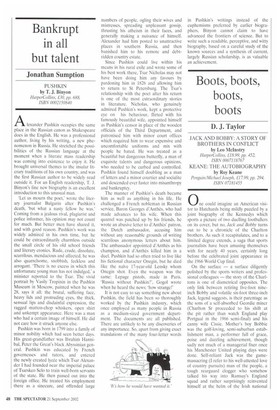Bankrupt in all but talent
Jonathan Sumption
PUSHKIN by T. J. Binyon HarperCollins, £30, pp. 688, ISBN 0002150840 Alexander Pushkin occupies the same place in the Russian canon as Shakespeare does in the English. He was a professional author, living by his writing, a new phenomenon in Russia. He stretched the possibilities of the Russian language at the moment when a literate mass readership was coming into existence to enjoy it. He brought universal themes to the insular literary traditions of his own country, and was the first Russian author to be widely read outside it. For an English readership, T. J. Binyon's fine new biography is an excellent introduction to this unusual man.
'Let us mourn the poet, wrote the literary journalist Bulgarin after Pushkin's death, 'but what a nasty fellow he was.' Coming from a jealous rival, plagiarist and police informer, his opinion may not count for much. But better men have shared it, and with good reason, Pushkin's work was widely admired in his own time, but he could be extraordinarily charmless outside the small circle of his old school friends and literary cronies. Rude, crude, dissolute, scurrilous, mendacious and affected, he was also quarrelsome, snobbish, feckless and arrogant. 'There is no excess in which this unfortunate young man has not indulged,' a minister reported to the Tsar. The vivid portrait by Vasily Tropinin in the Pushkin Museum in Moscow, painted when he was 28, says it all: the brutal, suffering face, heavy lids and protruding eyes, the thick, sensual lips and disdainful expression, the ragged mutton-chop whiskers, open shirt and unkempt appearance. Here was a man who had a certain image of himself. He did not care how it struck anyone else.
Pushkin was born in 1799 into a family of minor nobility which had seen better days. His great-grandfather was Ibrahim Hannibal, Peter the Great's black Abyssinian general, Pushkin was educated by French governesses and tutors, and entered the newly created lycee which Tsar Alexander I had founded near the imperial palace of Tsarskeo Selo to train well-born servants of the state. He then passed out into the foreign office, He treated his employment there as a sinecure, and offended large numbers of people, ogling their wives and mistresses, spreading unpleasant gossip, thrusting his atheism in their faces, and generally making a nuisance of himself. Alexander had him posted to unattractive places in southern Russia, and then banished him to his remote and debtridden country estate.
Since Pushkin could live within his means in his rural exile and wrote some of his best work there, Tsar Nicholas may not have been doing him any favours by pardoning him in 1826 and allowing him to return to St Petersburg. The Tsar's relationship with the poet after his return is one of the most extraordinary stories in literature. Nicholas, who genuinely admired Pushkin's work, kept a protective eye on his behaviour, flirted with his famously beautiful wife, appointed himself as Pushkin's censor in place of the wooden officials of the Third Department, and patronised him with minor court offices which required him to wear expensive and uncomfortable uniforms and mix with people he hated. He was treated as a beautiful but dangerous butterfly, a man of exquisite talents and dangerous opinions, who needed to be curbed and controlled. Pushkin found himself doubling as a man of letters and a minor courtier and socialite and descended ever faster into misanthropy and bankruptcy.
The manner of Pushkin's death became him as well as anything in his life, He challenged a French nobleman in Russian service, Baron Georges d'Anthes, who had made advances to his wife, When this quarrel was patched up by his friends, he wrote an abusive letter to d'Anthes' patron, the Dutch ambassador, accusing him without any reasonable grounds of writing scurrilous anonymous letters about him. The ambassador appointed d'Anthes as his champion, and d'Anthes killed him in a duel. Pushkin had so often tried to live like his fictional character Onegin, but he died like the naive 17-year-old Lensky whom Onegin shot, Even the weapon was the same: Lepage pistols, made in Paris. 'Russia without Pushkin'?', Gogol wrote when he heard the news; 'how stranger
It is not easy to say something new about Pushkin, the field has been so thoroughly worked by the Pushkin industry, which once employed as many people in Russia as a medium-sized government department. The documents are all published. There are unlikely to be any discoveries of any importance. So, apart from giving exact translations of the many four-letter words
in Pushkin's writings instead of the euphemisms preferred by earlier biographers, Binyon cannot claim to have advanced the frontiers of science, But to write such a readable, perceptive, and witty biography, based on a careful study of the known sources and a synthesis of current, largely Russian scholarship, is as valuable an achievement.










































































 Previous page
Previous page